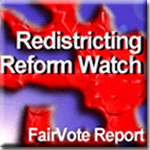Redistricting Reform Watch
 For
years, FairVote has highlighted how our nation's reliance upon
winner-take-all elections and single member districts for Congressional
elections without national standards has left our voting process open
to the abuses of unfair partisan gerrymandering. Insiders for decades
have known how powerful redistricting can be for elected officials to
protect friends and undermine opponents. It's a blood sport that both
parties have exploited, thereby minimizing the role of voters in the
political process. By gerrymandering the districts, legislators and
their political cronies have used redistricting to choose their voters,
before voters have had the opportunity to choose them.
For
years, FairVote has highlighted how our nation's reliance upon
winner-take-all elections and single member districts for Congressional
elections without national standards has left our voting process open
to the abuses of unfair partisan gerrymandering. Insiders for decades
have known how powerful redistricting can be for elected officials to
protect friends and undermine opponents. It's a blood sport that both
parties have exploited, thereby minimizing the role of voters in the
political process. By gerrymandering the districts, legislators and
their political cronies have used redistricting to choose their voters,
before voters have had the opportunity to choose them. The Re-Redistricting Crisis
Typically this process has been brutal and unfair, but occurred only once every decade. Then came House Majority Leader Tom DeLay's infamous drive in 2003 to undo his home state of Texas' incumbent-protection gerrymander with a Republican plan adopted over the objections of increasingly desperate Democratic state legislators. The Democrats' flight to neighboring states drew national attention, but it was Texas Republicans' successful unseating of four Democratic House seats through the re-redistricting process that caused party leaders to salivate.
In Georgia, in the wake of taking control of state government in 2004, Republicans in 2005 redrew the Democratic gerrymander of 2005. They piously defend the proposed lines as more compact, but their primary motivation is clear: two more Republican House seats in 2006.
Democrats talk of retaliation. House Minority Whip Steny Hoyer is no stranger to effective gerrymandering -- Democrats in his state of Maryland used redistricting to oust two Republicans in 2002 -- and has spoken with several Democratic governors about redrawing congressional lines in their states.
The Scramble to Reform
As a result of these efforts, state legislators across the nation are scrambling to develop independent redistricting reform proposals to curb these abuses. But even non-partisan redistricting can be a partisan tool. When a party doesn't have the votes to do its own plan, it obviously would prefer a group of retired judges to draw non-partisan lines than leaders of the other party.
Indeed, the redistricting problem can't be solved by any one state. No matter what states like California, Georgia and Louisiana do, we will be left with a mismatched patchwork of standards across the country. What's fair in the context of one state can be nationally unfair if non-partisan redistricting is done only in one party's strongholds, while the other party runs wild in its strongholds.
Going Beyond Tinkering at the Margins
The lessons of our years of research on Congressional elections indicate that resolving the gerrymandering dilemma is only part of the problem. Redistricting reform can minimize the ability of partisan legislators to punish their enemies and reward their friends, but for competitive elections, legislative diversity, and other public interest goals multimember districts with proportional voting are needed to maximize the effectiveness of these reforms – and ensure all voters have choices and no strong prospective candidate is shut out of a chance to participate.
In the rush to reform the redistricting process, FairVote calls on reformers and legislators alike to develop sound and effective policies tailored to these clear goals. Our Redistricting Reform Watch 2005 report monitors the impact of state redistricting reform proposals on future proportional voting options, competitive elections, voter choice, and diversity in government.